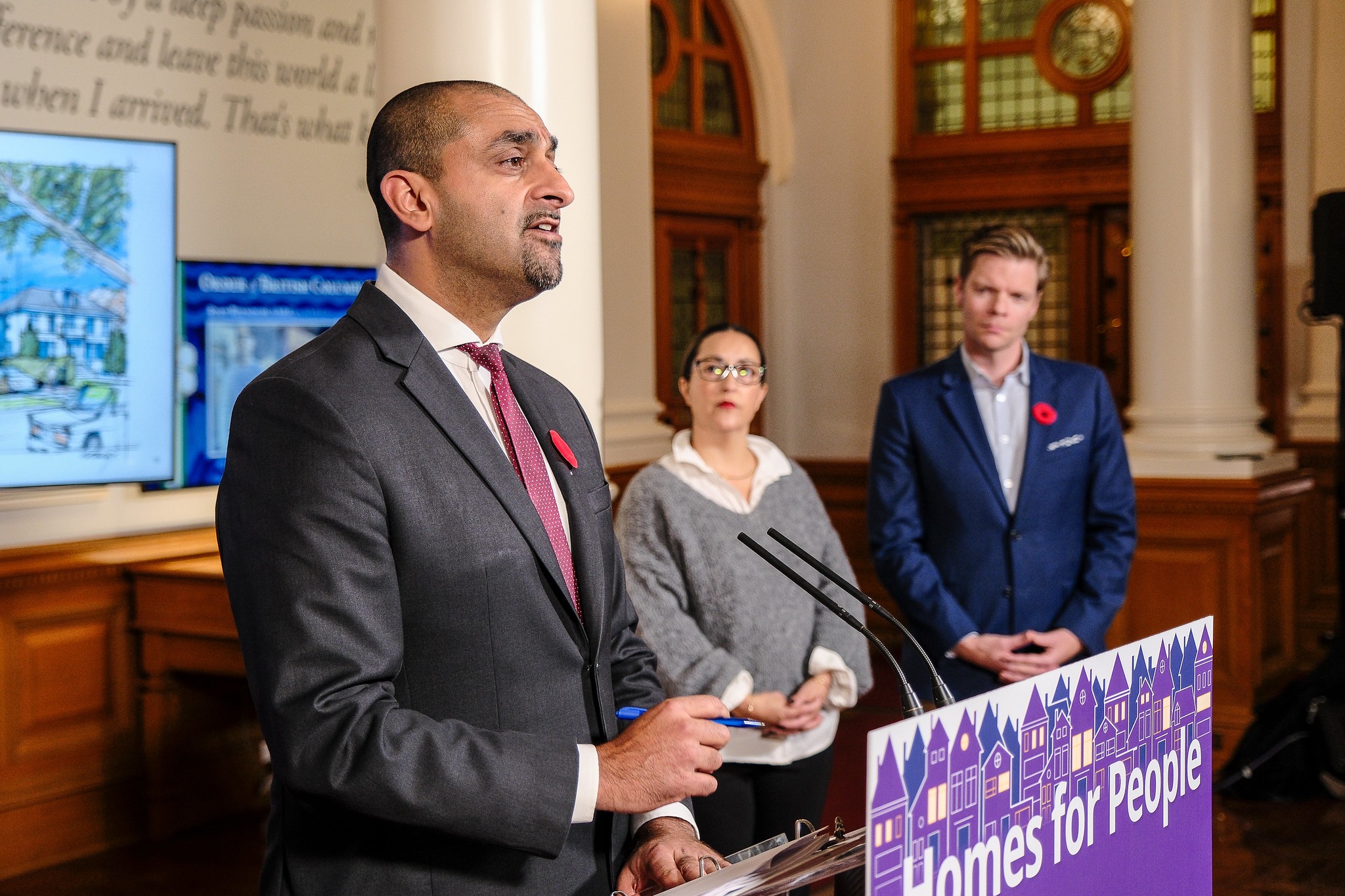B.C. proposes zoning mandates in new housing legislation
The laws would require municipalities allow a variety density and streamline their development processes.

Ravi Kahlon, minister of housing announces new housing legislation. – Province of B.C.
Key Takeaways:
- The new legislation would allow one secondary suite or one laneway home (accessory dwelling unit) in all communities throughout B.C.
- Municipalities will also be required to allow up to six units on lots currently zoned for single-family or duplex use, depending on size.
- The legislation would shift local planning and zoning processes to happen up front and require municipalities throughout B.C. to expedite and streamline permitting by updating community plans and zoning bylaws on a regular basis.
- The legislation would also phase out one-off public hearings for rezonings for housing projects that are consistent and aligned with the official community plans.
The Whole Story:
B.C. is opening up home development with sweeping zoning changes.
The province is introducing new legislation that would mandate that municipalities allow a minimum level of housing density and streamline the development process.
Officials say the changes will result in more small-scale, multi-unit housing, including townhomes, triplexes and laneway homes.
“Anyone looking for a place to live in a community they love knows how hard it is – and outdated zoning rules are making that even harder,” said Premier David Eby. “Constructing mostly high-rise condo towers or single-family homes means B.C. isn’t building enough small-scale multi-unit homes that fit into existing neighbourhoods and give people more housing options that are within reach. That’s why we’re taking action to fix zoning problems and deliver more homes for people, faster.”
Officials explained that historical zoning rules in many B.C. communities have led most new housing to be built mostly in the form of condos, or single-family homes that are out of reach for many people, leaving a shortage of options for the types of housing in between. They added that zoning barriers and layers of regulations have also slowed down the delivery of housing, making people go through long, complicated processes to build much-needed housing.
“The housing crisis has made it harder for growing families looking for more space, seniors looking to downsize, and first-time homebuyers who can’t find a home that meets their needs and budget,” said Ravi Kahlon, minister of housing. “This legislation strengthens the vibrancy of our communities, while building the type of housing that will help us address the housing crisis.”
The proposed legislation and forthcoming regulations will permit one secondary suite or one laneway home (accessory dwelling unit) in all communities throughout B.C.
In most areas within municipalities of more than 5,000 people, these changes will also require bylaws to allow for:
- three to four units permitted on lots currently zoned for single-family or duplex use, depending on lot size;
- six units permitted on larger lots currently zoned for single-family or duplex use and close to transit stops with frequent service.
Municipalities covered by the legislation may permit additional density if desired, but cannot have bylaws that allow for fewer permitted units than the provincial legislation.
The province also plans to speed up local housing development approvals by shifting local planning and zoning processes to happen up front. It will require municipalities throughout B.C. to expedite and streamline permitting by updating community plans and zoning bylaws on a regular basis.
New proposed changes will also phase out one-off public hearings for rezonings for housing projects that are consistent and aligned with the official community plans. Instead, there will be more frequent opportunities for people to be involved in shaping their communities earlier in the process when official community plans are updated.
“Modelling future scenarios cannot account for unforeseen circumstances, the changing nature of housing, real estate markets and other factors, but preliminary analysis indicates the province could see more than 130,000 new small-scale multi-unit homes in B.C. during the next 10 years,” said officials.
To support implementation, the province said it will continue to provide local governments with resources to speed up approval processes, including the recently announced $51 million to support local governments in meeting the new density zoning requirements, and $10 million for the Local Government Development Approvals Program.
The province added that additional legislation to support housing, transit-oriented development and infrastructure will be introduced in the coming weeks.
